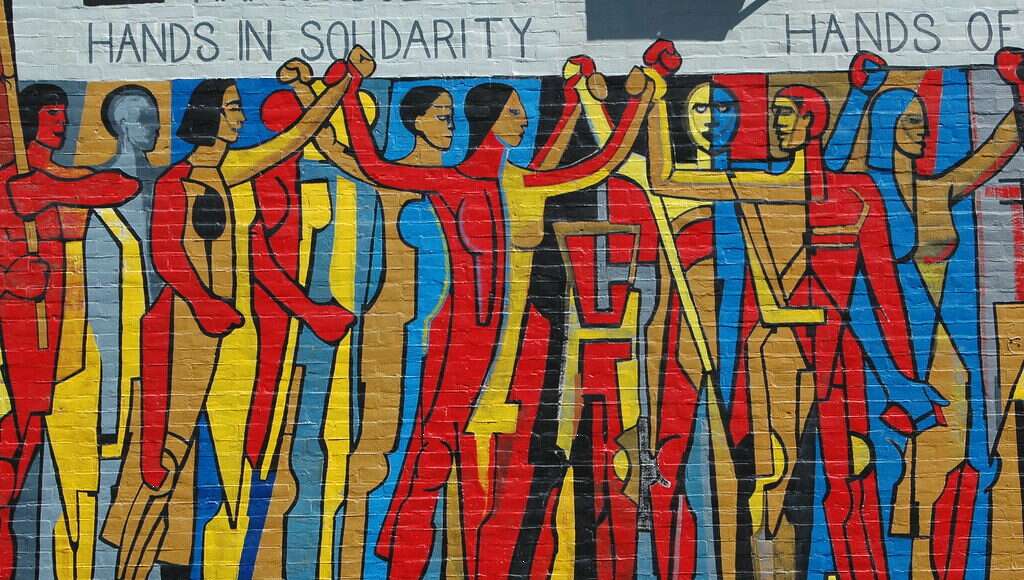Building Community Care Collectives: Beyond Neoliberalism and Capitalism

The Western world and its neoliberal values have deprioritized communities of care as the individual has become the central concern of politics. Turning on the news or scrolling through social media means watching humanitarian crises worldwide, and we risk becoming desensitized to others’ suffering. Yet, simultaneously, public intellectuals are offering practices of collective care, inviting and inspiring us to imagine a better world and offering us ways to imagine different ways of relating to one another so that the collective meets everyone’s needs. Scholars such as Crary, Giroux, Olssen, Schram, and others describe liberalism, neoliberalism, and capitalism and how they impact our lives, encouraging us to push past the fallacy of inevitability to imagine a world in which we prioritize people over profit. Scholars and public intellectuals like Bhandary, Milstein, and Anderson show readers how we can put theory into practice, pushing beyond acknowledging existing problems and encouraging readers to do their research, move into their communities, find third spaces, and start to build relationships with others to develop care collectives as an alternative to neoliberal practices that deprioritize social care and welfare. Collectivities of care offer us an alternative to capitalist and neoliberal regimes by providing third spaces for learning, practicing care by listening, doing healing work together, and caring for one another by imagining a better future for everyone.
Liberalism concerns itself with the individual and their rights and freedoms, focusing more on the individual and communal identity and how the government governs bodies than on the ability of the individual to create communities of care outside of governmental bodies. In John Charvet’s Liberalism: The Basics, Charvet introduces readers to liberalism and how it is understood “in terms of individual freedom, as in free speech or freedom of expression, freedom of association, free movement, economic freedom, sexual freedom” and explores what they mean for readers (Charvet 4). Charvet differentiates between multiple liberal regimes and how different political powers interpret values like freedom, community, and well-being differently. Charvet also states that liberalism exists as a practice or set of practices that “are inventions of a collection of human beings who agree to interact on the basis of certain rules” (Charvet 4). Despite community or collections of human beings being considered one of the core values of liberalism, “Care ethics’ conceptions of the moral domain and moral persons were commonly understood as incompatible with liberal accounts” (Bhandary 1). In Caring for Liberalism: Dependency and Liberal Political Theory, Asha Bhandary and Amy Baehr situate liberalism as contradictory to the ethics of care because of the lack of emphasis on dependency and the focus on individualism in liberalism.
Neoliberalism as an ideological regime decenters humanity and community care in favor power, emphasizing short-term individual profit over the community’s long-term well-being. In Neoliberalism: A Very Short Introduction, Manfred B. Steger and Ravi K. Roy situate neoliberalism “as a rather economistic ideology, which, not unlike its archrival Marxism, puts the production and exchange of material goods at the heart of the human experience” (Steger 38). By situating neoliberalism as an ideology that emphasizes economic issues, it is obvious that neoliberalism places profit over people, despite the suggestion that what is good for the economy is good for the community. Neoliberals emphasize the necessity of the market’s health, and its “governmentality is rooted in entrepreneurial values such as competitiveness, self-interest, and decentralization” (Steger 39). Neoliberalism’s emphasis on competitiveness and self-interest is detrimental to the community because it promotes the individual and their needs at all costs. In The Violence of Organized Forgetting: Thinking Beyond America’s Disimagination Machine, Henry Giroux posits that “under a neoliberal regime, the language of authority, power, and command is divorced from ethics, social responsibility, critical analysis, and social costs” (26). When the language of authority is divorced from ethics, those with authority prioritize the success of those in power over the community’s well-being. Simultaneously, the impact on the community is normalized and the community is held accountable for any harm they experience to protect the success of those in power.
Neoliberalism and liberalism are all interconnected, relating to humanity and how we collectively live our lives, and yet, the concept of care is foreign to each, as they prioritize systems and institutions over people. For instance, in Education Policy: Globalization, Citizenship and Democracy, Mark Olssen and John Codd describe how “Liberal philosophies and ideologies have provided the basis upon which the political economy and the interlinked social and economic systems of these societies have been built” (Olssen 73). Since liberal philosophies have provided a foundation for our political economy and social and economic systems, they also shape the way individuals and communities interact with one another. According to Foucault, classical liberalism was ideal as a new form of governmentality, as it was a “technology of rule that was consistent with the new science of political economy, and more generally with the rise of capitalism” (Olssen 74). Rather than centering community or communal ideals, classical liberalism began as a response to a call for a form of governmentality to align itself with capitalism and the political economy, decentering people in favour of new economic systems. Olssen and Codd posit that “Liberalism is individualist in relation to its embrace of a conception of human nature which asserts the moral and ontological primacy of the person as opposed to claims of social collectivity” (Olssen 75). Since liberalism and neoliberalism decenter care collectives in their emphasis on the individual, for us to develop a society that is based around the idea of collective care, there needs to be a new ideological system in place that builds on, or replaces, liberalism in all its forms.
Capitalism exists alongside liberalism and its various forms, and it is an economic system that thrives on exploitation and private ownership while de-prioritizing care in its relentless efforts toward unlimited profit for those with power. In Martin Hellwig’s “Capitalism: What has gone wrong? Who went wrong? Capitalism? The market economy? Governments? Neoliberal economics?” he quotes Braudel’s interpretation of capitalism: “Capitalism involves a striving for power, economic and political, and a suppression of competition, as well as wealth” (Hellwig 665). Hellwig situates capitalism as something that has fallen out of favour with people and proposes to explore what made it do so while examining scholars like Braudel, who suggest that it was never something that was in the best interest of everyday people, but something built around striving for success and not necessarily achieving it. Since capitalism does not provide success and prosperity but merely promises it, any capitalist system will be rife with income disparities and inequalities even before global recessions or pandemics occur. Sanford F. Schram posits that “the effects of the Great Recession have been serious indeed, but they are symptomatic of a larger economic restructuring where social welfare policies most significantly are revised to work consistently with the logic of the market rather than to counter it” (Schram 6). Schram describes how, following the Great Recession, policies surrounding social welfare stopped centering peoples’ issues in favour of aligning with the market and focusing on how the economy could benefit. This deprioritization of the community has led to a growing push for a new system of governmentality and a new market system that prioritizes care collectivities rather than a market.
To counter the neoliberal capitalist system currently in place, we need a system that prioritizes care ethics, community, and community care, and to develop a different system, we need to start a physical practice that is divorced from any vestige of neoliberal ideals. In Constellations of Care, Cindy Barukh Milstein posits that “potentialities for other pathways [those other than the one we are on] don’t arise from theories removed from the here-and-nowness of this everyday devastation, nor do lives worth living” (Barukh 6). Milstein begins her anthology with a reminder that theories and theorizing pale in comparison to physical action in the face of mass destruction and devastation worldwide. However, that is not to say that there is nothing salvageable from current practices and fields of thought that can allow us to imagine and create new worlds. For instance, according to Nicole Rose in “Solidarity Apothecary: Reclaiming Life, “anarchism is the commitment to eradicating all forms of dominion” (177) and “anarchist organizing [is also] about expressing care—unlearning machismo, and actually talking about the effects of state violence on our bodies, relationships and movements” (Milstein 177, 184). In short, for Rose, anarchism is about unlearning and recognizing the harm that has been happening and responding first with care, caring for one another, and the ways we have experienced harm. Part of our work now is realizing that recognizing harm is only the beginning of the care work involved in building collectivities of care outside of neoliberal institutions. The steps that follow, the organizing, the unlearning machismo, and the language of domination are each different parts that work together to help us build a new system that prioritizes our care.
Community care models center on the community’s needs and emphasize the necessity of building sustainable care paradigms that ensure that everyone is cared for when they need it rather than orienting around one singular path forward. By centering around care, movements can build the momentum needed to produce social change. For instance, In Undoing Border Imperialism, Harsha Walia posits that “All movements need an anchor in a shared positive vision, not a homogeneous or exact or perfect condition, but one that will nonetheless dismantle hierarchies, disarm concentrations of power, guide just relations, and nurture individual autonomy alongside collective responsibility” (Walia 11). Any movement, but especially one that seeks to separate from neoliberal capitalist ideals, must focus on imagination, shared values, and a desire to learn how we can care for each other better. In Scorched Earth: Beyond the Digital Age to a Post-Capitalist World, Jonathan Crary argues that “if there is to be a livable and shared future on our planet, it will be a future offline, uncoupled from the world-destroying systems and operations of 24/7 capitalism” (Crary 8). While he neglects to present an alternative to our present world, focusing more on the pitfalls of the digital world, he creates space for imagination as he asks readers to consider a world beyond capitalism. Crary draws readers’ attention to the various types of harm we experience under capitalism and pushes back against the idea that our lives are unalterable. In doing so, Crary practices a valuable part of anarchist organizing; recognizing the harm done and calling attention to how it was not inevitable.
Care collectives require space outside of neoliberal capitalist institutions that require something of us, a space that will provide the freedom to imagine a system outside of the one that we live and work in that does not adhere to capitalistic values. In Creating Third Spaces of Learning for Post-Capitalism, Gary L. Anderson describes third spaces as being “created in-be-tween our lived cultural and social identities (first space) and the dominant culture that seeks to define us (second space)” (Anderson 4). Third spaces can look like libraries, parks, community centres, and other places that do not require individuals to spend money or to align themselves with the dominant culture. Third spaces exist in these in-between spaces and “are hybrid spaces where new identities and social relations are negotiated” (Anderson 17). Though third spaces offer a place away from mainstream capitalist ideals, that does not mean they are neutral. Instead, they provide space to develop new ways of being and to explore your relationship with the world and others around you. Yet, these third spaces depend on government funding to run, meaning they are subject to the whims of a government that prioritizes the economy over the social. For instance, American government officials are defunding libraries, and Canadian business owners are calling for libraries and their services to lose their funding over book content (Democracy Now 2023; CBC 2023). Now more than ever, we need community spaces where we can imagine new worlds together. Third spaces like libraries need to be protected and funded for their role in inspiring, imagining, and radicalizing today’s youth to imagine a new world.
Care collectives and movements for a post-capitalist world orient themselves around shared values and a common vision of a better future. While specific details may be different from person to person, for a movement to succeed, members need to have the capacity to imagine a better world. The capacity for imagination requires individual members to receive physical, emotional, and spiritual support through their communities, which means community members need to engage in social responsibility to ensure that everyone feels supported and no one gets left behind. Care collectives can provide space in different ways for people to gather to care for one another. Some may offer physical safe spaces, some may offer safe(r) public spaces, and some may provide online spaces where people who share ideas can come together and mobilize for each other through crowdfunding programs and petitions. An example of a group that created a space for others to learn is the Anarcha-Feminist Library of Toulouse, or Bibliotèque Anarcha-Féministe, a self-organized library that rents a space in France alongside other like-minded anarchist-minded groups to provide a space for community building that centers anarcha-feminism. Its organizers created the space so they could “focus on establishing strong, dependable, and honest, interpersonal relationships by working directly and practically with other people” in their library space (Milstein 54). For them, collective care was about working with other people in a way that allowed them to develop circles of care while also providing books to the community. The organizers emphasize the value of strong relationships for creating and maintaining spaces where knowledge is shared, not hidden, and everyone is a valuable part of the community, capable of caring for others and receiving care from those around them.
The Bibliotèque Anarcha-Féministe is far from the only example of a community care collective; there are many others, each of which carry their work out in vastly different ways but orient themselves around building strong communities. For example, there was a group called “Nightshade” in Pittsburgh that formed “a queer and trans collective” who “strove to go beyond the boundaries of identity politics and access the transformative capacity of raging against conformity in [their] everyday lives” (Milstein 25). This group focused on providing space for queer and trans individuals to come together to transcend identity politics and push back against conformity in a place where it was safe to be themselves. This group “hosted study groups on consent and radical conflict resolution, organized workshops and skill shares, made zines to spell out our pain and conjure up moments for collective healing, participated in solidarity actions and night marches, held safe and sexy trans-positive dance parties” and much more (Milstein 23). This care collective offered physical space for their community through events based around their relationship with one another, where they gave each other space to recognize the pain and harm they may have been or may be experiencing while also providing space for learning, growing, and developing their ideas. This care collective took place in the homes of several members throughout its lifetime, though that does not mean that care collectives must only occur in private spaces. Care collectives can form anywhere if the group orients itself around shared values of safety, community, healing, and more.
Another example of a care collective is the Brown Girl Rise collective in Portland, Oregon, based around a concern for young black and brown girls and nonbinary youth growing up in majority-white cities. Some members of the group were parents who were “learning how hard it was to find affinity spaces and culturally affirming education for [their] kids, particularly for Black girls and nonbinary youths, and noticing how [their] children suffered as a result of this lack” (Milstein 107). This group discovered a lack of space for young Black and brown girls and nonbinary youth, and they decided to do something about it: to create a collective built around care and culturally affirming education for youth. Brown Girl Rise demonstrates how collectives can recognize an issue and come together to figure out how to improve the situation by offering space for youth of all ages. In their work, the collective places an “emphasis on kinship [which] has meant that [their] programming activities concentrate on relationships between youths rather than between youths and adult/authority figures [and] much time is spent in games and relationship-building activities” (111). By emphasizing the value of relationships between youth, the collective provides a space where the youth can play, find joy, and learn at their own pace rather than pushing them to be as productive as possible. In doing so, the collective centres the community and its needs, providing a space where kids can play and learn together. This emphasis on play ensures that the culturally affirming lessons they learn and the material they cover in these spaces are repeatedly reaffirmed through their community as they develop a larger community of care within the collective.
Care collectives or community care practices act as an alternative to and an interruption into capitalist and neoliberal regimes through their provision of a third space, whether physical or metaphysical, practicing care in multiple forms, and inviting us to imagine a better future for everyone. While neoliberal ideologies deprioritize the individual and their needs in favour of the health of the economy, care collectives centre the experiences of the individual and the group, providing space for people to share their perspectives and the harm that they have experienced before enabling us to do something with our pain, to care for others and to build strong relationships with our community so that when harm occurs, so too can healing. Community collectives empower individuals through their emphasis on healing through learning, through sharing knowledge and values, and through speaking about past traumas and harm because it is through our connection with others that we can build the foundation for a new world. Furthermore, community collectives often provide third spaces for learning, spaces that exist outside of the economy, in that it does not seek to make money off patrons, but that provide space for people to learn free from the pressures of institutions and any expectation of perfection or mastery.
Works Cited
“Business owners push to defund southern Manitoba libraries over book content accused of being ‘pornographic’.” CBC News, CBC News, 20 July 2023, www.cbc.ca/news/canada/manitoba/manitoba-library-business-petition-defund-1.6910336.
“Missouri GOP Votes to Defund Libraries Amid a Nationwide Republican Crackdown.” Democracy Now, Democracy Now, 12 Apr. 2023, www.democracynow.org/2023/4/12/headlines/missouri_gop_votes_to_defund_libraries_amid_a_nationwide_republican_crackdown.
Anderson, Gary L. Creating Third Spaces of Learning for Post-Capitalism : Lessons from Educators and Activists. Routledge, 2023.
Bhandary, Asha L. Freedom to Care: Liberalism, Dependency Care, and Culture. 1st ed., Routledge, 2020.
Charvet, John. Liberalism. 1st ed., Routledge, 2018.
Crary, Jonathan. Scorched Earth: Beyond the Digital Age to a Post-Capitalist World. Verso Publishing, 2022.
Giroux, Henry. The Violence of Organized Forgetting: Thinking Beyond America’s Disimagination Machine. City Lights Publishing. 2014.
Neoliberalism: A Very Short Introduction, Oxford University Press, 2010. ProQuest Ebook Central, https://ebookcentral.proquest.com/lib/mcmu/detail.action?docID=480647.
Hellwig, Martin. “‘Capitalism: What Has Gone Wrong?’: Who Went Wrong? Capitalism? The Market Economy? Governments? ‘Neoliberal’ Economics?” Oxford Review of Economic Policy, vol. 37, no. 4, 2021, pp. 664–77, https://doi.org/10.1093/oxrep/grab036.
Milstein, Cindy Barukh. Constellations of Care: Anarcha-Feminism in Practice. First edition., Pluto Press, 2024.
Olssen, Mark, et al. Education Policy: Globalization, Citizenship and Democracy. SAGE, 2004.
Schram, Sanford. The Return of Ordinary Capitalism : Neoliberalism, Precarity, Occupy. Oxford University Press, 2015.
Steger, Manfred B. and Ravi K. Roy. Neoliberalism: A Very Short Introduction, Oxford University Press, 2010.
Walia, Harsha, et al. Undoing Border Imperialism. AK Press, 2014.
Read more at By Emily Rafuse.
Articles, Cultural Pedagogy, Public EducationRelated News
News Listing

By Maya Phillips ➚
Failure to Reeducate: Perpetuations of Cultural Fascism in Post-War Germany
Articles, Cultural Pedagogy, Public Pedagogy
February 9, 2026

By Rosemary Kasiobi Nwadike ➚
Feminist Miseducation in the Afro-West: Examining (In)Formal Gender Indoctrinations
Articles, Education, Resistance, Social Justice
July 11, 2025

